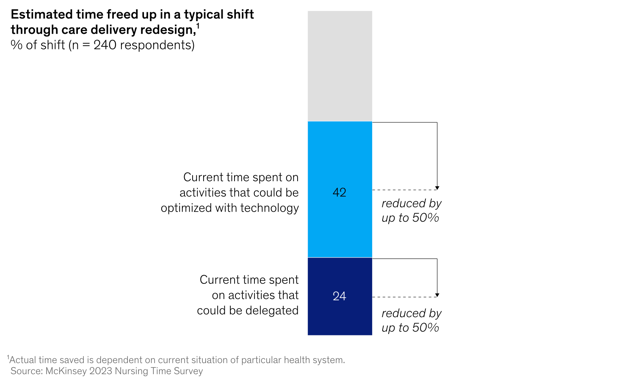We stand at the threshold of a revolution in healthcare administration. The transformative potential of Artificial Intelligence (AI) and intelligent automation promises to redefine traditional healthcare practices. They are set to streamline operations and catalyze significant improvements in patient outcomes. However, the journey to this revolution isn't without its challenges.
As healthcare administration grows more complex due to evolving patient expectations, regulatory hurdles, and surging costs, healthcare organizations are facing immense pressure. They are called upon to deliver exceptional care and improved patient outcomes while simultaneously streamlining operations and reducing overhead. Doing all this manually can be daunting, if not impossible, leading more organizations to recognize the potential of AI and intelligent automation.
The Impact of AI and Automation: A Fiscal Perspective
The fiscal implications of AI and automation are monumental. Administrative simplification, driven by AI, could save an estimated $265 billion of annual administrative spending. Such figures underscore the tremendous financial potential these technologies hold for the future of healthcare.
The Transformative Synergy: AI and Predictive Analytics
When synchronized with predictive analytics, AI triggers a transformative chain reaction in healthcare. The machine learning algorithms and deep learning networks that are integral to AI can analyze big data sets. They can pinpoint patterns and make predictions, thus enabling more precise diagnoses and optimization of healthcare services.
By leveraging AI models to accurately predict patient diagnoses, healthcare administrators are able to implement early interventions effectively. These interventions, facilitated by AI, can substantially enhance patient outcomes and decrease the need for intensive treatments. Such proactive healthcare management is particularly critical for managing chronic diseases, which, according to the National Institute of Health (NIH) will add up to estimated global cost of $47 trillion by 2030.
The Broad Influence of AI
AI’s influence extends far beyond individual healthcare providers to encompass the entire healthcare ecosystem. It plays a vital role in easing the burden on strained health systems by facilitating optimal resource allocation. AI can help prioritize tasks, allocate resources, and streamline workflows, thereby maximizing efficiency.
Predictive AI has the power to shift healthcare from a reactive model to a proactive approach. By foreseeing future health needs, healthcare providers can intervene earlier, reducing the risk of severe complications or unnecessary hospital admissions. AI also supports personalized healthcare, allowing treatment plans to be tailored to a patient's unique circumstances and needs. The impact of these changes is profound, offering enhanced patient outcomes, increased efficiency, and substantial cost savings.
The Role of Automation in Healthcare Administration
Automation has emerged as a transformative force in the world of healthcare administration. A study by McKinsey & Company indicates that more than a third of tasks in the healthcare sector could be automated, significantly driving operational efficiency.
One of the fundamental ways automation is transforming healthcare is by simplifying routine and repetitive tasks such as patient scheduling, billing, and claims processing. These areas, while crucial for smooth healthcare operations, are time-consuming and prone to human errors. With the power of automation, healthcare providers can streamline these processes, ensuring they are handled swiftly and accurately.
A Reduction in Human Errors and Enhanced Accuracy
Human errors in administrative tasks, such as data entry, can lead to significant problems including incorrect billings, delays in treatment, and even potential legal issues. However, automation can play a key role in minimizing these errors. According to a report from the Institute of Medicine, automation can prevent medical errors, improve care, and decrease costs.
The increased accuracy automation brings to healthcare administration directly impacts productivity, freeing up human resources to focus on more patient-centric tasks. For instance, automated billing ensures accurate invoicing, which in turn reduces the time spent resolving billing disputes. In a similar vein, automated patient scheduling can reduce no-show rates, ensuring better utilization of healthcare professionals' time.
The Role of AI in Enhancing Automation
While automation alone streamlines processes, AI can further augment the benefits of automation in healthcare. For example, AI algorithms can learn from historical data, anticipate problems, and optimize processes.
This powerful AI-fueled automation can optimize administrative workflows, providing predictive insights to prevent bottlenecks and significantly reducing the administrative burden on healthcare staff. For example, a recent study from McKinsey & Company has found that automation has the potential to free up to 15% of nurses’ time. This reduction in time savings could improve nursing workload and allow them to spend more time with patients, coaching fellow nurses, and participating in professional-growth opportunities. Exhibit 1 below highlights the estimated time that may be freed by automation in a typical nurse’s shift.

Beyond Cost Savings: The Impact on Patient Engagement
AI and automation promise to reshape the patient experience, moving beyond cost savings and operational efficiency. These technologies can dramatically enhance patient engagement through personalized treatment plans and automated reminders.
Automated systems can send timely reminders for medication intake or upcoming appointments, reducing missed doses and no-shows. AI-powered platforms can provide patients with personalized health information, educating them about their conditions, and encouraging adherence to treatment protocols. Studies suggest a strong correlation between AI-powered interventions and improved patient adherence, further reinforcing these technologies' potential to foster engagement and compliance.
Ethical and Regulatory Considerations: Balancing Innovation with Accountability
As we navigate this transformative era, it's crucial to consider the ethical and regulatory implications of AI and automation in healthcare. As we move rapidly into the digital age, issues of transparency, accountability, and privacy remain paramount.
Implementing these technologies, while respecting ethical norms and regulatory standards, poses a formidable challenge. Healthcare organizations need robust governance frameworks to ensure data protection, transparency in AI decision-making processes, and adherence to ethical norms. The World Health Organization and other global entities emphasize these principles, underscoring the importance of protecting patients' rights and ensuring ethical conduct in the application of AI in healthcare.
The Future of Healthcare Administration: An AI and Automation-Driven Model
As we look ahead, the integration of AI and automation is not a distant vision—it's a present reality, actively shaping the future of healthcare and are set to herald a new era in healthcare administration. By leveraging these technologies, organizations can realize substantial cost savings, enhanced efficiency, and improved patient outcomes.
No matter where you are in your journey, Productive Edge has the innovative Artificial Intelligence accelerator and digital strategy services you need to accelerate your healthcare transformation. Get in touch with our experts to learn more about how you can jumpstart your AI journey toward revolutionary healthcare.





